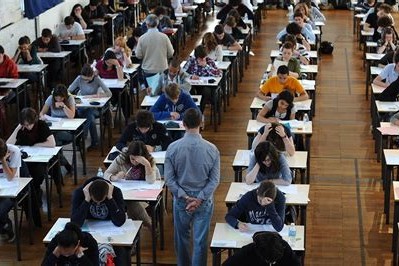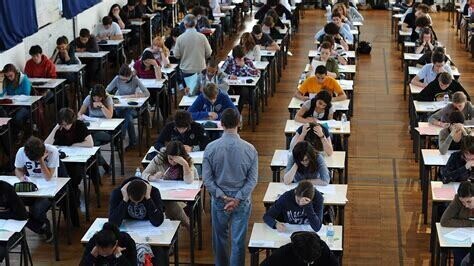
posted 23rd May 2022

If you’re a student sitting right now in front of a desk piled high with textbooks, past papers, index cards, highlighters and energy drinks, wondering how on earth you are ever going to get all this stuff into your head - or indeed you are a teacher sitting in front of a desk piled high with exam scripts wondering how on earth you are ever going to get all this stuff marked - you might well be asking yourself this question.
It’s an important one, and one that should (once exams are over … ) be discussed and debated, as it goes to the heart of what education is about, and what it is for. There is no doubt that the use of assessment is an essential part of teaching and learning, whether it’s a quick, informal response to a student’s oral contribution, or detailed feedback on a long piece of written work, as it provides teachers and students with information about what students have or have not learnt, and guides them in what they need to do next.
However, this kind of ‘formative’ assessment, which is part of all effective teaching, and is a collaborative affair between teachers and students, is very different from public exams set and marked by external authorities. These exams (SATs, GCSEs, A-Levels, International Baccalaureate, Pre-U), are very focused on outcomes, measured in grades, with huge consequences hanging on them for both students and teachers. Fail to get the grades as a student, and you don’t get into university / don’t get the job you wanted; fail to get the grades as a teacher / school and you slip down the league tables, have fewer students wanting to come to your school, may even be heading for closure. Have public exams had their day? Or should we keep them?
There is much that is anachronistic about public exams in the UK. Producing an extended piece of writing with no collaboration with anyone else and with no opportunity to consult any external sources (in the expectation that all the necessary information will be [temporarily] stored in the student’s head) is a very ineffective way to produce quality work, which is highly unlikely to be replicated in anyone’s working life in the twenty-first century. The requirement to write by hand is also decidedly last century, and does not allow for the constant back and forth of editing on the go which composing on a computer allows, and which every writer knows hugely improves the quality of any kind of writing. Mass public exams at 16 made sense when a majority of students left at that age; now that some form of education or training is compulsory till 18, they simply interrupt that education.
Exams also distort teaching, and arguably prevent learning. When I was an English teacher, my Y11 classes stopped learning anything new in November. The rest of the year was devoted to preparing for mock exams, taking mock exams, returning mock exams, revising material, working through past papers, analysing mark schemes and model answers in the hope of bagging a few extra marks here or there, going on study leave, taking exams, waiting for results. They got very good at doing English exams, but they didn’t learn much about literature, or reading, or writing. My impression was that this was their experience across all subjects. Finally, in September of Y12, they started learning something again.
There was one exception to this routine. The Y11 I taught in 2019-20 had their GCSEs cancelled because of Covid, so we spent March onwards studying (remotely) a wide range of literature in a much freer way, without any need to worry about exams. It was salutary to note that those of that cohort who went on to take English in Y12 were far ahead of where previous cohorts had been when they started sixth form, because they had spent the summer term learning, not being assessed.
Y11 had to be that way (and I suspect is that way in most schools) because of the high stakes of GCSE exams for the students (and the school), but nine months of learning nothing new is an awfully long time in the life of a young person at their most receptive and open. Not to mention that it is incredibly boring and stressful.
The stress that public exams cause is another significant argument against them. For some students, this is a minor and short lived inconvenience; for others, it has a major impact. Students who already have fragile mental health are particularly at risk.
The strongest argument for public exams is the information that the grades provide. This information helps employers to pick employees, universities to pick students, parents to pick schools. This information is objective, because all students have to take the same exams, which are marked according to objective criteria by people who have no stake in the outcome.
It can also be argued that working life is going to be stressful, competitive, and full of deadlines, so why should school not be like that too? Protecting students from these stresses is not going to help them in later life. Exams give focus and purpose to learning, and provide objective recognition of hard work and success.
We do of course have (against our will) a massive controlled experiment in what the world would look like without public exams. In both 2020 and 2021, public exams were cancelled because of Covid. The first time, in 2020, ended in chaos when a poorly designed algorithm produced wildly inaccurate outcomes and the government was obliged to accept teachers’ assessments without modification or checking. The second time, in 2021, a better designed system was set up, but, given that it mostly involved moving exams in house, to be set and marked by teachers, it replicated (and even magnified) a lot of the issues with exams detailed above.
Clearly the emergency response to the Covid pandemic was not the ideal context in which to rethink public exams. However, it is worth thinking about them and their purpose as well as just doing them.
Good luck with your exams when they start …
Motions that go with this topic
- This house would replace public exams with teacher assessments.
- This house would replace public exams with externally assessed coursework.
- This house would abolish GCSEs.
- This house would abolish exams.





